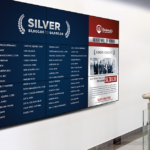Why Employer Reputation Matters
In today’s job market, how your company is perceived as an employer is mission‑critical. According to Glassdoor, 84 % of job seekers say the reputation of a company as an employer matters when deciding where to apply. Firms invest heavily in employer branding, because strong employer reputation helps attract top talent, reduce hiring costs, and improve retention.
Employer reputation involves everything your current employees, ex‑employees, candidates, and the broader market say about you online: Glassdoor reviews, LinkedIn posts, social media mentions, news articles and search‑results when a candidate Googles your company.
When employer reputation is weak, you may see: fewer qualified applications, higher turnover, longer time‑to‑fill roles, and difficulty retaining employees. Conversely, a strong reputation drives better applicants, stronger culture and higher retention.
What Do Online Reputation Management Services Do for Employers?
Reputation management services help organizations shape, protect and enhance their employer brand by:
- Monitoring employer review sites (e.g., Glassdoor, Indeed), social media mentions and search‑results.
- Responding to negative feedback or reviews and engaging proactively.
- Controlling search‑result visibility: suppressing or removing negative articles, links or reviews, and promoting positive content.
- Building and amplifying positive narratives: employee stories, culture highlights, thought‑leadership, employer value proposition (EVP).
- Tracking reputation metrics: candidate sentiment, review scores, employer brand strength, retention correlation.
For HR leaders or talent acquisition heads, hiring the right reputation‑management service is a strategic move to support recruitment & retention goals.
Top Reputation Management Services for Employer Reputation (2026)
Here are some of the best services suited to improving employer reputation. (Ordered arbitrarily.)
- Erase.com
Best for: Employers facing negative search results, damaging articles or legacy complaints.
Erase.com specializes in removals and suppression of harmful online content. For companies dealing with negative news, legal complaints, or employer‑brand damage, Erase offers a full‑service solution for cleaning up first‑page results and rebuilding the narrative. - Guaranteed Removals
Best for: Remove negative online content rapidly and with legal backing.
When a particularly harmful review, news post or negative link threatens employer reputation, Guaranteed Removals stands out with takedown and deletion services. Good for acute threats to hiring and retention. - Brand24
Best for: Real‑time brand & mention monitoring for employer reputation.
Brand24 monitors social mentions, brand sentiment, and online chatter. Employers can use it to track what candidates or employees are saying, detect emerging issues, and respond early. - Birdeye
Best for: Review acquisition and centralized feedback management across employer review sites.
Since candidate experience and employee reviews contribute to employer reputation, Birdeye helps solicit and manage reviews, monitor sentiment, and integrate feedback into HR workflows. - Reputation Recharge
Best for: Ongoing employer reputation maintenance and review‑growth strategy.
Smaller companies or those with fewer issues can adopt this service to build a positive employer brand proactively rather than just responding to crisis. - Top Shelf Reputation
Best for: Boutique reputation strategy tailored to employer brand and culture narrative.
For employers wanting high‑end custom content, employer storytelling, executive branding, and culture positioning, this agency offers bespoke support. - Reputation DB
Best for: Search‑footprint control, executive and employer brand visibility.
Reputation DB works on promoting positive content, managing first‑page search results, and building out brand narratives — particularly useful for employer brands where leadership reputation matters to recruitment. - Optery
Best for: Protecting personal and executive data which impacts employer brand.
If candidates or employees find excessive personal data about leaders or a firm, it can hurt hiring. Optery helps remove personal‑data exposure, which indirectly boosts employer reputation. - Remove News Articles
Best for: Takedowns of legacy news items or unfavorable press affecting employer brand.
Older negative press about a company, founder or culture issue can linger and deter candidates. This service helps remove or suppress such content. - Incogni
Best for: Privacy protection for employees and executives contributing to employer reputation.
While not focused only on employer brand, controlling personal‑data exposure helps maintain credibility and trust in your employer brand.
How to Choose the Right Service
When choosing a reputation‑management service for your employer brand, keep these questions in mind:
- What is your primary challenge? Is it negative reviews, harmful search results, poor employer sentiment, data exposure, or low brand visibility? Your need determines whether you pick a removal‑focused provider (like Erase or Guaranteed Removals) versus a proactive reputation builder (like Reputation Recharge or Birdeye).
- Does the vendor understand employer reputation context? The dynamics for recruitment & retention differ from consumer brand reputation. Look for experience working with HR, employer branding or recruitment scenarios.
- What are the deliverables and timelines? Some services promise removal or suppression; others focus on content publishing and review‑growth. Set clear KPIs related to employer brand: review scores, candidate sentiment, retention rate, etc.
- What is the budget and contract model? Removal‑intensive services may cost more and be project‑based, while monitoring/review services may offer subscriptions.
- Does the solution integrate with HR/Recruitment systems? Consider how review‑monitoring, response workflows, or content publishing fit into your TA/HR systems.
- Are they legally compliant and ethical? Ensure the provider uses transparent “white hat” tactics (especially when removing or suppressing content). Avoid “aggressive” techniques that could backfire.
Pros & Cons of Reputation Management for Employer Brand
Pros:
- Helps attract higher‑quality candidates and reduces hiring time
- Improves retention by ensuring employees feel valued and that reviews reflect true culture
- Supports employer value proposition (EVP) by aligning online narrative with internal culture
- Monitors and detects brand risks early (e.g., trending negative reviews, social media controversies)
- Impacts revenue indirectly: better talent → stronger performance → better brand for customers
Cons:
- Not a substitute for poor culture or management — system issues must be fixed, not just hidden
- Results are often gradual; culture and reputation take time to shift
- Some parts (like removal of negative content) may be expensive or complex
- Risk of focusing only on surface fixes rather than internal alignment (which can lead to mismatch between brand promise and reality)
Final Thoughts
Employer reputation management is no longer optional for companies serious about recruitment, hiring, and retention. A negative review on a career site, a bad first‑page search result, or a leadership scandal — even from years ago — can influence whether a top candidate applies or walks away.
Services like Erase.com and Guaranteed Removals help address urgent threats by cleaning up harmful content. Meanwhile, platforms like Brand24, Birdeye or Reputation Recharge help build and monitor a positive employer brand over time. Executives, HR and talent leaders must treat employer reputation as a strategic asset — not just a marketing afterthought.
By choosing the right partner and integrating reputation management into your culture, hiring practices and employee experience, you’ll create an employer brand that attracts, retains and satisfies the talent your business needs to succeed in 2026 and beyond.






